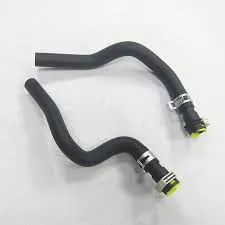Understanding Hydraulic Brake Lines in Automotive Systems and Their Importance for Safety
Oktoba . 17, 2024 09:21 Back to list
Understanding Hydraulic Brake Lines in Automotive Systems and Their Importance for Safety
Understanding Hydraulic Brake Lines A Crucial Component of Vehicle Safety
Hydraulic brake lines are an integral part of any vehicle's braking system, playing a crucial role in ensuring safety on the roads. The brake system's function relies heavily on the efficient transmission of force from the brake pedal to the brake components at the wheels. This article explores the significance, functionality, construction, and maintenance of hydraulic brake lines, emphasizing why they are vital for automotive safety.
What Are Hydraulic Brake Lines?
Hydraulic brake lines are specialized tubes or hoses that transport brake fluid from the master cylinder to the brake calipers or wheel cylinders. The hydraulic system is designed to multiply the force exerted by the driver when pressing the brake pedal. When the brake pedal is depressed, the master cylinder pushes brake fluid through these lines to the brakes, causing them to engage and slow down or stop the vehicle.
The Functionality of Hydraulic Brake Lines
The hydraulic braking system operates based on Pascal’s law, which states that pressure applied to a confined fluid is transmitted undiminished throughout the fluid. When a driver presses the brake pedal, a piston inside the master cylinder pushes brake fluid through the hydraulic brake lines. This action creates pressure in the lines, leading to the brake calipers clamping down on the brake pads against the rotors, ultimately generating the necessary friction to slow down or stop the car.
The efficiency of this system is paramount. The brake lines must be capable of withstanding high pressure and resist expansion. If a brake line were to burst or leak, the loss of pressure would mean the brakes would fail, potentially leading to catastrophic accidents.
Construction of Hydraulic Brake Lines
Hydraulic brake lines are typically made from a combination of materials that cater to durability, flexibility, and resistance to high temperatures and corrosion
. The most common types include1. Metal Brake Lines Usually made from stainless steel or copper-nickel alloy, these lines offer robust strength and resistance to corrosion. They are usually found in the sections of the braking system that require greater protection where damage is more likely.
hydraulic brake line

2. Rubber Brake Hoses These are flexible lines used in areas where movement occurs, such as the connection from the vehicle's chassis to the brake calipers. While they provide flexibility, they are susceptible to wear and tear, which can affect braking performance over time.
3. PTFE (Polytetrafluoroethylene) Lines Often used in high-performance vehicles, these hoses have an inner layer of PTFE, which minimizes friction and heat build-up, enhancing braking response.
Maintenance of Hydraulic Brake Lines
Ensuring the longevity and reliability of hydraulic brake lines is essential for vehicle safety. Regular inspection and maintenance can prevent brake failure due to line damage or fluid leaks. Here are some key maintenance tips
1. Inspect for Leaks Regularly check the brake lines for signs of fluid leaks, which can often appear as wet spots or stains near the line connections or along the line itself.
2. Check for Wear and Corrosion Pay attention to signs of wear, especially on rubber hoses that can crack or bulge. Metal brake lines should also be inspected for rust and corrosion.
3. Fluid Quality Brake fluid can absorb moisture over time, which can compromise braking efficiency. It is crucial to replace brake fluid as recommended by the vehicle manufacturer.
4. Professional Servicing It is advisable to have a qualified technician service the braking system at regular intervals. They can use specialized tools to check line pressure and assess the overall health of the hydraulic system.
Conclusion
Hydraulic brake lines are a fundamental aspect of a vehicle's braking system, crucial for effective vehicle control and safety. As such, they deserve proper attention concerning maintenance and inspection. As technology progresses, advancements in materials and design of hydraulic brake lines will continue to enhance their reliability and performance, underscoring the importance of keeping this vital component in optimal working condition. Ultimately, ensuring the integrity of hydraulic brake lines not only safeguards the vehicle's performance but also protects the lives of its occupants and others on the road.
